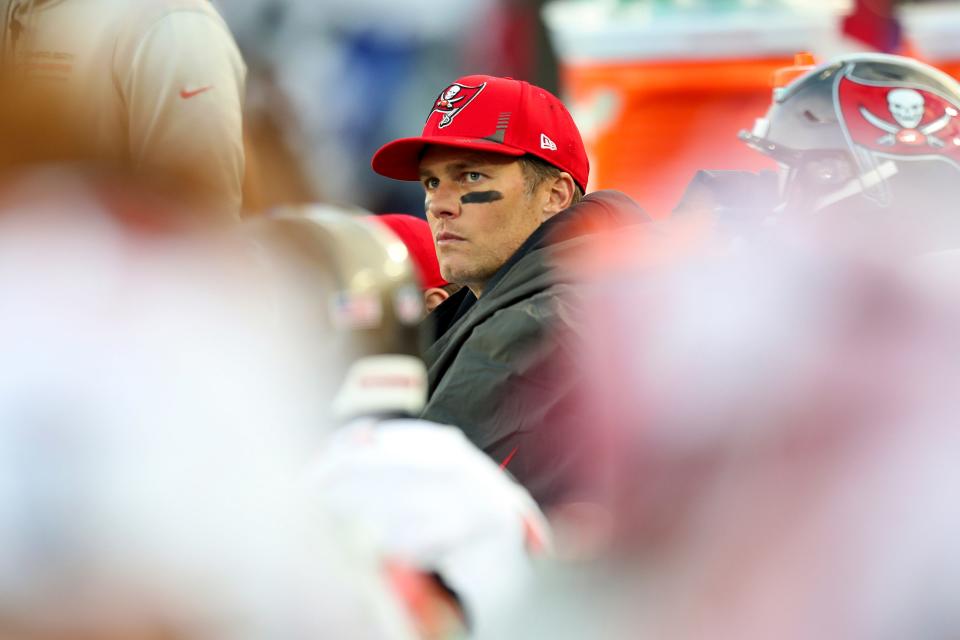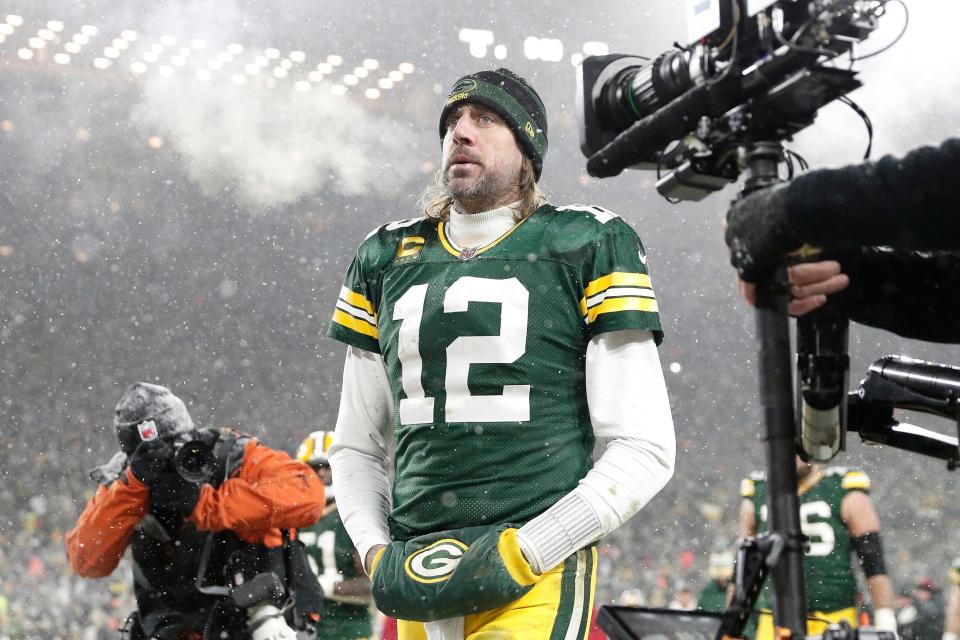Is it time? What are Tom Brady and Aaron Rodgers likely to do?

The NFL's spectacular playoff weekend will long be remembered, and not just by the winning teams. It may have been the end of the line for Tom Brady and Aaron Rodgers, the best quarterbacks in an era of great quarterbacking.
After a regular season in which the 44-year-old Brady and the 38-year-old Rodgers played near the top levels of their careers, the events of the weekend made it painfully clear that their best days are behind them.
If anyone had doubts that the veteran quarterbacks had lost a step or two, those doubts might have been erased Sunday night when Kansas City's Patrick Mahomes and Buffalo's Josh Allen demonstrated emphatically what is required for excellence at that position in 2022.
Mahomes and Allen do not yet throw passes as accurately as Brady or Rodgers. Nobody does. But they are so much quicker, so much more willing and able to extend plays and run for first downs, so much more in command of modern offenses. Ditto for Cincinnati's second-year quarterback, Joe Burrow.
There might have been some denial about that reality, but the reality became stark during the Chiefs' victory Sunday night.
Not that Brady nor Rodgers were the reason their teams lost. The Packers' special teams were fatally flawed, and the Bucs' defense had no answers until the fourth quarter. Still, those were the kind of games Brady and Rodgers pulled out routinely in the past, the kind of games upon which they built their reputations. This time they didn't get it done.
Green Bay's 13-10 loss to San Francisco on Saturday night, and the Bucs' 30-27 loss to the Los Angeles Rams on Sunday, were followed by statements in which neither quarterback attempted to minimize the possibility that it had been his final game. For Rodgers, it wasn't the first time or the second time. For Brady, it was a clear indication that retirement, after 22 NFL seasons, is at least a serious consideration.

The perfect time for Brady to retire was presented to him last year. He had changed teams and won his seventh Super Bowl, pretty much settling the issue of whether he was the most accomplished NFL quarterback of all-time. He could have gone out on top, in excellent physical condition, with nothing left to prove. But Brady loved where he was and what he was doing, so he signed an extension (for 2022) in March and came back for another record-breaking season.
Not, however, a championship season. To go out on that note, he will have to come back and try again.
By contrast, Rodgers still has a lot to prove, especially in the postseason. In 14 seasons as Green Bay's starting quarterback, he has one Super Bowl appearance. The Packers earned the NFC's top seed in 2020, only to lose to the Bucs in the playoffs. This year they were even better, especially on defense, and again earned home-field advantage for the playoffs, only to be bounced out in their first game by a team that lost seven games.
Rodgers has one year left on his contract, but only because he negotiated out of the final year (2023) as part of his attempt to get traded last summer. If he does return for another year with the Packers, it will be something of a lame-duck season. It might not be in the long-term interests of the Packers, who face the same kind of salary-cap problems as the Bucs, to go through that.
In other words, Rodgers does not have the same kind of bargaining leverage he had a few months ago.
Brady's NFL future is entirely in his hands. He can play another year or he can retire. Does anyone question that if he really wanted to, Brady could engineer a trade to some other place to finish his career? He holds all the cards.
Rodgers does not. The only option totally under his control would be to retire and leave $27 million on the table. He can revisit his trade demand, or he can simply return to the Packers with no control over what they do with the rest of their roster. Rodgers has already stated he is not interested in being part of a rebuild, just in case the Packers would want to rebuild with a 39-year-old quarterback.
My guess is that Brady will be back for one more season, and Rodgers will either retire or be traded. If he "retires," he will make a Gronkowskian comeback in 2023.
If either of them makes a move, it will set off another round of quarterback hopscotch, like the one that had Matthew Stafford, Jared Goff, Carson Wentz, Teddy Bridgewater and Sam Darnold changing teams last year.

Meanwhile we have Stafford, Mahomes and Burrow playing for all the marbles along with Jimmy Garoppolo, who was once drafted to replace Brady. Almost eight years later, as it turned out, he replaced Rodgers as a Super Bowl candidate.
This article originally appeared on The Ledger: Have we seen the last games for Tom Brady and Aaron Rodgers?

